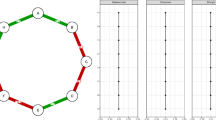Abstract
This article addresses the role of probabilistic prediction in the systems organization of behavioral acts. The systems mechanisms predicting the required results of the behavioral acts of living beings in stable and changing conditions are discussed. It is suggested that in all these types of behavior, the parameters of results satisfying the leading needs, which constitute the aims of behaviour, are strictly predicted. The author believes that probabilistic prediction is related only to the means, actions, and accompanying emotional states, as well as that possible ways of achieving results, i.e., not to the parameters but to the means of achieving the required results.
Similar content being viewed by others
REFERENCES
P. K. Anokhin, “The methodological significance of cybernetics,” in: Materialistic Dialectics and Methods in Natural Sciences [in Russian], Moscow (1968), pp. 547–587.
D. N. Menitskii and V. V. Trubachev, Information and Questions of Higher Nervous Activity (Probability and the Conditioned Reflex) [in Russian], Meditsina, Leningrad (1974).
A. V. Saltykov, A. V. Toloknov, and N. K. Khitrov, Behavior and Environmental Indeterminacy [in Russian], Meditsina, Moscow (1996).
A. V. Saltykov and N. K. Khitrov, “Functional systems theory and directed behavior,” Zh. Vyssh. Nerv. Deyat., 51,No. 2, 279–287 (2001).
I. M. Sechenov, Selected Philosophical and Psychological Works [in Russian], Gospolitizdat, Moscow (1947), p. 442.
P. V. Simonov, “The need-information organization of brain activity,” Zh. Vyssh. Nerv. Deyat., 29,No. 3, 467–477 (1979).
K. V. Sudakov, G. Ts. Agayan, Yu. E. Vagin, et al., Systems Quanta in Physiological Processes [in Russian], Academician Ts. P. Agayan International Humanitarian Fund for Armenian Studies, Moscow (1997).
K. V. Sudakov (ed.), Systems Genesis Theory [in Russian], Gorizont, Moscow (1997).
K. V. Sudakov, “The dynamic stereotype as a systems property of the brain,” Vestn. Ros. Akad. Med. Nauk., No. 4, 3–12 (2001).
K. V. Sudakov and A. V. Kotov, “Functional switching of the dominant motivation in the systems organization of behavioral acts,” Zh. Vyssh. Nerv. Deyat., 35,No. 6, 1022–1029 (1985).
I. M. Feigenberg, “Probabilistic prediction in brain activity,” Vopr. Psikhol., No. 2, 59–67 (1963).
K. V. Shuleikina, Systems Organization of Food-Related Behavior [in Russian], Nauka, Moscow (1971).
Author information
Authors and Affiliations
Rights and permissions
About this article
Cite this article
Sudakov, K.V. Functional Systems Theory and the Probabilistic Prediction of Behavior. Neurosci Behav Physiol 34, 505–507 (2004). https://doi.org/10.1023/B:NEAB.0000022638.96382.dd
Issue Date:
DOI: https://doi.org/10.1023/B:NEAB.0000022638.96382.dd



